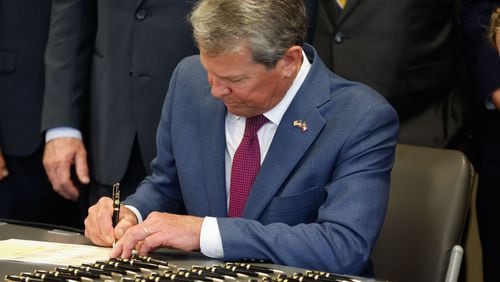Since the 1968 race for President when Richard Nixon vowed to bring about ‘law and order’ during a time of social unrest in America, U.S. politics have been defined in part by a Republican Party which stands with police and law enforcement.
But things have been slightly different in the aftermath of the Jan. 6 attack on the U.S. Capitol.
This week, 21 House Republicans voted against a bill awarding Congressional gold medals to the U.S. Capitol Police and the Washington, D.C. Police, whose officers defended lawmakers as Congress was counting the 2020 electoral votes.
Democrats immediately attacked.
“If you voted against this measure, you clearly do not support law enforcement,” said Rep. Marilyn Strickland, D-Wash.
Three Georgians voted ‘No’ — U.S. Rep. Marjorie Taylor Greene, R-Rome, U.S. Rep. Jody Hice, R-Greensboro, and U.S. Rep. Andrew Clyde, R-Athens.
Greene objected to language calling the Jan. 6 attack an ‘insurrection.’
Hice — who said he was ‘deeply grateful for the bravery’ of the Capitol Police — said he wanted the bill to say more about an officer killed in April at a Senate traffic checkpoint.
“I’ve consistently condemned political violence of any kind, whether it happened here at the Capitol or in cities across America,” Hice said this week. Hice is running for secretary of state in 2022.
But to many lawmakers, such objections to the gold medals rang hollow.
“This is shameful and embarrassing,” said U.S. Rep. Adam Kinzinger, R-Ill., who has called on the GOP to drop election conspiracy theories that led to the attack.
The gold medal bill could have gone into excruciating details of the violent acts committed against police on Jan. 6, as court records are filled with those descriptions.
For example, earlier this month, an Alpharetta roofing contractor — a former Marine — was arrested for attacking two police officers. Police body camera video showed Kevin Douglas Creek kicking and punching police.
Thankfully, in the history of Congress, violence has been rare at the U.S. Capitol.
165 years ago this summer, the nation was bitterly divided over the brutal beating of slavery opponent Sen. Charles Sumner, attacked on the Senate floor by Rep. Preston Brooks of South Carolina.
“We hold it would be improper for the House to express any opinion upon the facts,” said Congressman Howell Cobb of Georgia, who led the defense of Brooks. (Cobb would go on to chair the convention which formed the Confederacy.)
Just as Brooks supporters brushed aside his attack in 1856, most Republicans in 2021 have shrugged off further investigation of the Capitol attack, with only a few dozen voting for an independent investigation.
“Speaker Pelosi’s creation of a so-called “independent” commission is blatant political theater,” said Rep. Clyde.
With or without the Congressional gold medals, the Capitol Attack investigation isn’t going away, as the feds will continue to arrest those who did not ‘Back the Blue’ on Jan. 6.
Jamie Dupree has covered national politics and the Congress from Washington, D.C. since the Reagan administration. His column appears weekly in The Atlanta Journal-Constitution. For more, check out his Capitol Hill newsletter at http://jamiedupree.substack.com
About the Author






